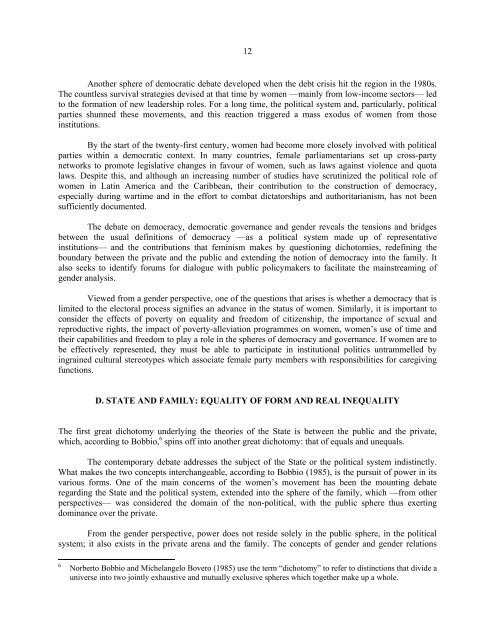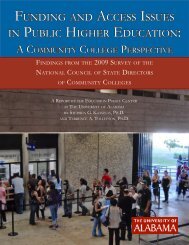Women in Latin America and the Caribbean - Cepal
Women in Latin America and the Caribbean - Cepal
Women in Latin America and the Caribbean - Cepal
You also want an ePaper? Increase the reach of your titles
YUMPU automatically turns print PDFs into web optimized ePapers that Google loves.
12<br />
Ano<strong>the</strong>r sphere of democratic debate developed when <strong>the</strong> debt crisis hit <strong>the</strong> region <strong>in</strong> <strong>the</strong> 1980s.<br />
The countless survival strategies devised at that time by women —ma<strong>in</strong>ly from low-<strong>in</strong>come sectors— led<br />
to <strong>the</strong> formation of new leadership roles. For a long time, <strong>the</strong> political system <strong>and</strong>, particularly, political<br />
parties shunned <strong>the</strong>se movements, <strong>and</strong> this reaction triggered a mass exodus of women from those<br />
<strong>in</strong>stitutions.<br />
By <strong>the</strong> start of <strong>the</strong> twenty-first century, women had become more closely <strong>in</strong>volved with political<br />
parties with<strong>in</strong> a democratic context. In many countries, female parliamentarians set up cross-party<br />
networks to promote legislative changes <strong>in</strong> favour of women, such as laws aga<strong>in</strong>st violence <strong>and</strong> quota<br />
laws. Despite this, <strong>and</strong> although an <strong>in</strong>creas<strong>in</strong>g number of studies have scrut<strong>in</strong>ized <strong>the</strong> political role of<br />
women <strong>in</strong> Lat<strong>in</strong> <strong>America</strong> <strong>and</strong> <strong>the</strong> <strong>Caribbean</strong>, <strong>the</strong>ir contribution to <strong>the</strong> construction of democracy,<br />
especially dur<strong>in</strong>g wartime <strong>and</strong> <strong>in</strong> <strong>the</strong> effort to combat dictatorships <strong>and</strong> authoritarianism, has not been<br />
sufficiently documented.<br />
The debate on democracy, democratic governance <strong>and</strong> gender reveals <strong>the</strong> tensions <strong>and</strong> bridges<br />
between <strong>the</strong> usual def<strong>in</strong>itions of democracy —as a political system made up of representative<br />
<strong>in</strong>stitutions— <strong>and</strong> <strong>the</strong> contributions that fem<strong>in</strong>ism makes by question<strong>in</strong>g dichotomies, redef<strong>in</strong><strong>in</strong>g <strong>the</strong><br />
boundary between <strong>the</strong> private <strong>and</strong> <strong>the</strong> public <strong>and</strong> extend<strong>in</strong>g <strong>the</strong> notion of democracy <strong>in</strong>to <strong>the</strong> family. It<br />
also seeks to identify forums for dialogue with public policymakers to facilitate <strong>the</strong> ma<strong>in</strong>stream<strong>in</strong>g of<br />
gender analysis.<br />
Viewed from a gender perspective, one of <strong>the</strong> questions that arises is whe<strong>the</strong>r a democracy that is<br />
limited to <strong>the</strong> electoral process signifies an advance <strong>in</strong> <strong>the</strong> status of women. Similarly, it is important to<br />
consider <strong>the</strong> effects of poverty on equality <strong>and</strong> freedom of citizenship, <strong>the</strong> importance of sexual <strong>and</strong><br />
reproductive rights, <strong>the</strong> impact of poverty-alleviation programmes on women, women’s use of time <strong>and</strong><br />
<strong>the</strong>ir capabilities <strong>and</strong> freedom to play a role <strong>in</strong> <strong>the</strong> spheres of democracy <strong>and</strong> governance. If women are to<br />
be effectively represented, <strong>the</strong>y must be able to participate <strong>in</strong> <strong>in</strong>stitutional politics untrammelled by<br />
<strong>in</strong>gra<strong>in</strong>ed cultural stereotypes which associate female party members with responsibilities for caregiv<strong>in</strong>g<br />
functions.<br />
D. STATE AND FAMILY: EQUALITY OF FORM AND REAL INEQUALITY<br />
The first great dichotomy underly<strong>in</strong>g <strong>the</strong> <strong>the</strong>ories of <strong>the</strong> State is between <strong>the</strong> public <strong>and</strong> <strong>the</strong> private,<br />
which, accord<strong>in</strong>g to Bobbio, 6 sp<strong>in</strong>s off <strong>in</strong>to ano<strong>the</strong>r great dichotomy: that of equals <strong>and</strong> unequals.<br />
The contemporary debate addresses <strong>the</strong> subject of <strong>the</strong> State or <strong>the</strong> political system <strong>in</strong>dist<strong>in</strong>ctly.<br />
What makes <strong>the</strong> two concepts <strong>in</strong>terchangeable, accord<strong>in</strong>g to Bobbio (1985), is <strong>the</strong> pursuit of power <strong>in</strong> its<br />
various forms. One of <strong>the</strong> ma<strong>in</strong> concerns of <strong>the</strong> women’s movement has been <strong>the</strong> mount<strong>in</strong>g debate<br />
regard<strong>in</strong>g <strong>the</strong> State <strong>and</strong> <strong>the</strong> political system, extended <strong>in</strong>to <strong>the</strong> sphere of <strong>the</strong> family, which —from o<strong>the</strong>r<br />
perspectives— was considered <strong>the</strong> doma<strong>in</strong> of <strong>the</strong> non-political, with <strong>the</strong> public sphere thus exert<strong>in</strong>g<br />
dom<strong>in</strong>ance over <strong>the</strong> private.<br />
From <strong>the</strong> gender perspective, power does not reside solely <strong>in</strong> <strong>the</strong> public sphere, <strong>in</strong> <strong>the</strong> political<br />
system; it also exists <strong>in</strong> <strong>the</strong> private arena <strong>and</strong> <strong>the</strong> family. The concepts of gender <strong>and</strong> gender relations<br />
6<br />
Norberto Bobbio <strong>and</strong> Michelangelo Bovero (1985) use <strong>the</strong> term “dichotomy” to refer to dist<strong>in</strong>ctions that divide a<br />
universe <strong>in</strong>to two jo<strong>in</strong>tly exhaustive <strong>and</strong> mutually exclusive spheres which toge<strong>the</strong>r make up a whole.











